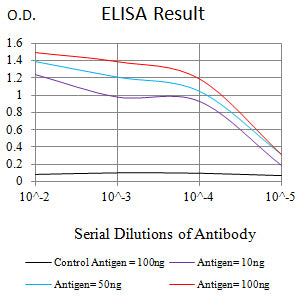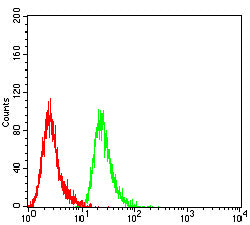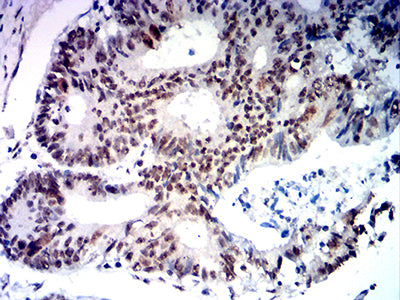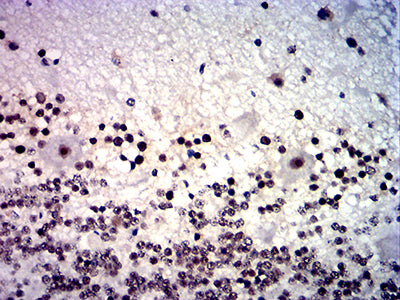



| WB | 咨询技术 | Human,Mouse,Rat |
| IF | 咨询技术 | Human,Mouse,Rat |
| IHC | 1/200-1/1000 | Human,Mouse,Rat |
| ICC | 技术咨询 | Human,Mouse,Rat |
| FCM | 1/200-1/400 | Human,Mouse,Rat |
| Elisa | 1/10000 | Human,Mouse,Rat |
| Aliases | NMYC; ODED; MODED; N-myc; bHLHe37 |
| Entrez GeneID | 4613 |
| clone | 2A4E9 |
| WB Predicted band size | 49.5kDa |
| Host/Isotype | Mouse IgG1 |
| Antibody Type | Primary antibody |
| Storage | Store at 4°C short term. Aliquot and store at -20°C long term. Avoid freeze/thaw cycles. |
| Species Reactivity | Human |
| Immunogen | Purified recombinant fragment of human MYCN (AA: 337-464) expressed in E. Coli. |
| Formulation | Purified antibody in PBS with 0.05% sodium azide |
+ +
以下是3篇关于MYCN抗体的代表性文献摘要(部分信息为模拟简化版,建议核对原文):
1. **文献名称**:*Amplified DNA with limited homology to myc cellular oncogene is shared by human neuroblastoma cell lines and a neuroblastoma tumour*
**作者**:Schwab, M., et al.
**摘要**:该研究首次报道了MYCN基因在神经母细胞瘤中的扩增现象,使用特异性抗体确认其过表达与肿瘤进展相关,为后续MYCN作为肿瘤标志物奠定基础。
2. **文献名称**:*MYCN expression in neuroblastoma: a mixed message?*
**作者**:Brodcur, G.M., et al.
**摘要**:通过免疫组化和Western blot分析MYCN蛋白表达,验证了抗体在区分MYCN扩增与非扩增肿瘤中的可靠性,并探讨其临床分型的应用价值。
3. **文献名称**:*Antibody-based detection of MYCN amplification in neuroblastoma: prognostic implications*
**作者**:Weiss, W.A., et al.
**摘要**:研究比较了不同MYCN抗体的灵敏度和特异性,提出基于免疫染色的快速检测方法可作为高危神经母细胞瘤患者的预后评估工具。
4. **文献名称**:*Targeting MYCN in cancer: From biological understanding to therapeutic strategies*
**作者**:Dang, C.V., et al.
**摘要**:综述了MYCN在肿瘤中的分子机制,包括抗体在检测其表达及靶向治疗研究中的应用,强调抗体在基础研究与临床转化中的重要性。
注:实际文献需通过PubMed或Google Scholar检索确认,建议以“MYCN antibody”、“neuroblastoma”、“oncogene”为关键词筛选近年高引论文。
MYCN Antibody Background
The MYCN antibody is a crucial tool in cancer research and diagnostics, specifically targeting the MYCN oncoprotein encoded by the MYCN gene. MYCN, a member of the MYC family of transcription factors, plays a pivotal role in regulating cell proliferation, differentiation, and apoptosis. Amplification of the MYCN gene is strongly associated with aggressive neuroblastomas and other malignancies, correlating with poor prognosis and resistance to therapy. MYCN antibodies are widely used to detect MYCN protein expression levels in tumor tissues, aiding in diagnosis, risk stratification, and research into MYCN-driven oncogenic mechanisms.
In neuroblastoma, MYCN amplification serves as a key biomarker for disease staging and treatment planning. Antibodies against MYCN enable immunohistochemical (IHC) analysis, Western blotting, and flow cytometry, helping researchers assess protein localization, overexpression, and interactions with other oncogenic pathways. Additionally, MYCN antibodies are instrumental in preclinical studies evaluating MYCN-targeted therapies, such as small-molecule inhibitors or gene-silencing approaches.
Despite their utility, MYCN antibodies face challenges, including cross-reactivity with other MYC family proteins (e.g., c-MYC) and variability due to tumor heterogeneity. Recent advancements in monoclonal antibody development have improved specificity, enhancing their reliability in both research and clinical settings. Ongoing studies focus on understanding MYCN's role in tumorigenesis and leveraging antibodies to develop novel therapeutic strategies, such as immunoconjugates or biomarker-driven personalized therapies.
Overall, MYCN antibodies remain indispensable for unraveling MYCN biology and advancing translational oncology.
×